-
July, 26,2025
Understanding the Role of Bloom Strength in Soft Gelatin Capsules
-
July, 25,2025
Bloom Strength and Its Impact on Hard Gelatin Capsules
-
July, 21,2025
How Gelatin Is Revolutionizing Pet Food: A Healthier Option for Dogs
-
June, 22,2025
Collagen as a Trusted Ingredient: Meeting Global Demand with Reliable Supply
A Closer Look at Gelatin for Meat Processing
Gelatin is a vital ingredient in meat processing, known for its ability to improve texture, moisture retention, and stability. Derived from animal collagen, it forms a gel that enhances the quality of products like sausages, ham, and canned meats. With growing consumer demand for healthier, more appealing meat products, understanding the functional uses of gelatin has never been more important.
Understanding the Role of Gelatin in Meat Processing
Gelatin in meat processing
Gelatin is a natural protein commonly used in meat processing. It has the properties of gelation, water retention, adhesion, and thickening. It is made by hydrolyzing collagen in animal skin, bones, and connective tissue. It has high biocompatibility and is suitable for processing various meat products.
In meat processing, gelatin is mainly used to improve texture and stability. It dissolves when heated and solidifies after cooling to form a stable network structure, giving meat products elasticity and tender taste. At the same time, gelatin can tightly combine minced meat, fat, and water, improve the integrity and slicing performance of the product, and facilitate processing and storage.
Gelatin also has excellent water retention capacity, which can reduce water loss during processing and storage, and maintain the juiciness of the product. In addition, gelatin acts as a thickener in products such as aspic and sausages to form an ideal texture and appearance. For low-fat meat products, gelatin can partially replace fat to meet consumers' demand for healthy food.
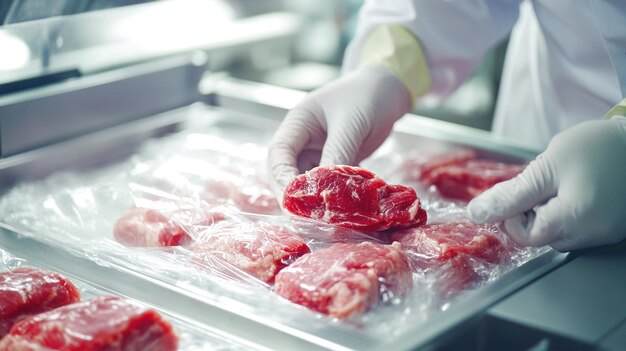
Key Applications of Gelatin in Meat Products
Gelatin is widely used in the processing of various meat products due to its unique functional properties, including the following aspects:
• Meat aspic and meat paste products: Gelatin acts as a gelling agent to provide a uniform texture and transparent luster.
• Sausage and ham: Improve elasticity and adhesion, reduce water loss, and increase juiciness.
• Canned meat products: Adjust the consistency, maintain shape and taste, and form a protective film to extend the shelf life.
• Low-fat meat products: Use gelatin to partially replace fat to maintain a good taste and meet health needs.
By adding gelatin, the overall quality of meat products has been significantly improved, meeting consumers' dual pursuit of deliciousness and health.
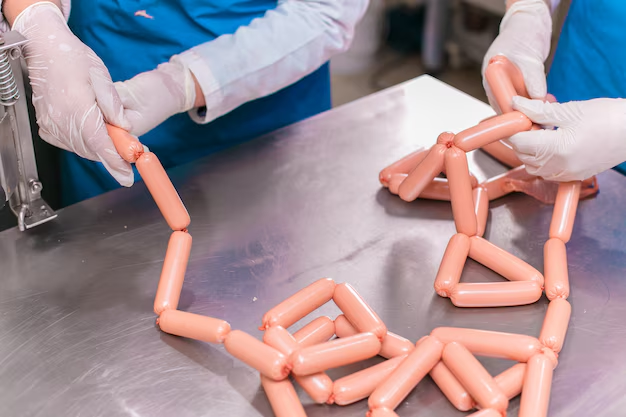
Functional Uses of Gelatin in Meat Processing
Gelatin plays an irreplaceable role in meat processing. It is widely used in a variety of meat products by taking advantage of its unique gelling, water retention, bonding, and emulsification properties.
1. Binding and Shaping
Gelatin is known for its excellent bonding and shaping effects in meat processing. During meat processing, minced meat, minced meat, and fat are usually difficult to combine tightly, but gelatin can form a strong bonding force between them after heating and dissolving.
• Bonding function: As a natural adhesive, gelatin can act as a "glue" in meat products, combining materials of different textures and ingredients. It is widely used in the processing of meat products such as ham, sausage, and meatloaf. By adding gelatin, minced meat, fat, and other ingredients can be evenly mixed and firmly combined, improving the overall structure of the product and making it less likely to fall apart during processing, slicing, and packaging.
• Shaping function: During the cooling process, gelatin solidifies to form a three-dimensional network structure, providing meat products with good elasticity and toughness. For example, gelatin can keep the shape of smoked ham intact during processing, and it will not break after slicing. The amount of gelatin in meat products can be adjusted according to product requirements to achieve different textures. For example, increasing the gelatin content can make sausages more elastic and sliced more evenly.
• Application in special meat products: For canned meat, chicken rolls, sauced meat, and other meat products, gelatin can also bind the sauce and meat together to form a smooth appearance and good taste. This application not only greatly improves product quality in industrial production, but also meets consumers' high requirements for the taste and appearance of meat products.
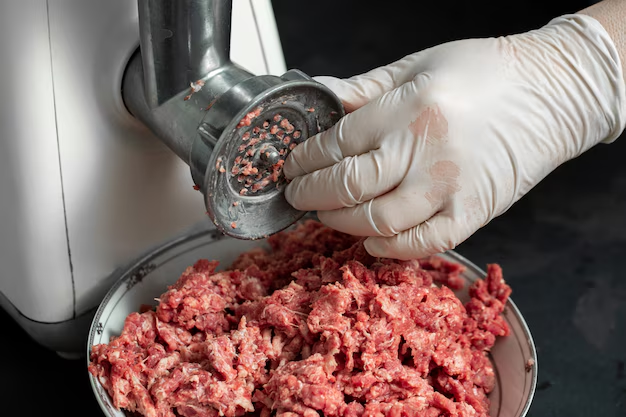
2. Moisture Retention
Moisturizing is one of the most critical functions of gelatin in meat processing. It can effectively absorb and lock in moisture, thereby maintaining the juiciness and tenderness of meat products.
• Source of water retention capacity: Gelatin molecules contain a large number of hydrophilic groups such as carboxyl and amino groups, and have strong water absorption and water retention capabilities. Generally, gelatin can absorb several times its own weight in water and form a mesh structure in meat products to lock the moisture tightly. This feature is particularly important for products such as sausages, ham, aspic, and meat sauce that need to maintain a high moisture content.
• Reduce processing losses: In the process of meat processing, it is often necessary to go through steps such as stirring, heating, and extrusion. These processes will cause water loss in meat products and affect the final quality. The moisturizing function of gelatin can effectively reduce this loss. For example, when producing low-fat ham, due to the low-fat content, it is easy to dry out. Adding gelatin can keep it moist and improve the taste.
• Role in freezing and thawing: In the production of frozen meat products, the moisturizing function of gelatin is particularly significant. During the freezing process, the moisture in meat products will freeze, which may cause juice loss during thawing. Gelatin can lock this moisture in the network structure it forms, reducing juice loss and maintaining the freshness and flavor of meat products.
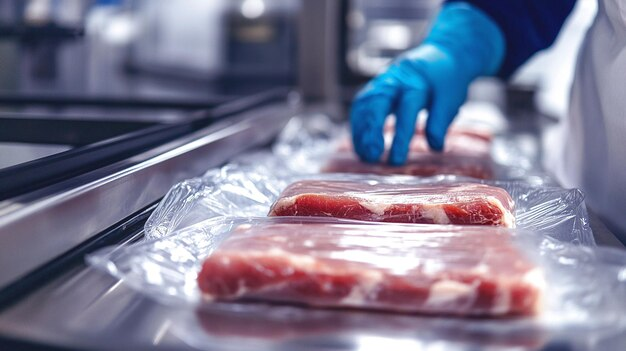
3. Preservation and Glazing
Gelatin not only plays an important role inside meat products but also forms a protective film on the surface of the product to achieve the effect of preservation and glazing.
• Preservation effect: Gelatin has good film-forming properties and can form a thin and transparent film on the surface of meat products to isolate oxygen, microorganisms, and pollutants. This film can slow down the oxidation of fat and prevent meat products from spoiling. At the same time, it can also retain moisture inside meat products and extend the shelf life of the product. The air permeability of the gelatin film can be adjusted according to the gelatin concentration and ratio to meet the preservation needs of different meat products.
• Antibacterial effect: Gelatin film can also inhibit the growth of microorganisms and reduce the rate of proliferation of spoilage bacteria on the surface of meat products. Although gelatin itself does not have strong antibacterial properties, it can be used as a carrier and mixed with natural antibacterial agents (such as plant extracts, spice essential oils, etc.) to further enhance the preservation effect of meat products.
• Glazing function: In addition to preservation, the transparent film formed by gelatin after cooling can also add gloss to meat products, making them more attractive. This feature is widely used in products such as ham, bacon, and aspic, which not only improves the appearance of the products but also increases consumers' desire to buy.
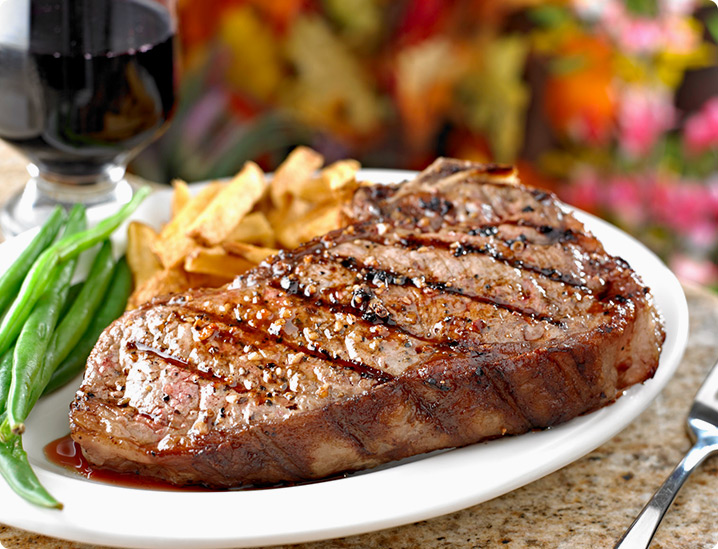
4. Emulsification and Stabilization
Emulsification and stabilization are one of important functions of gelatin in meat processing, especially in some meat products with high-fat content.
• Emulsification: Meat products usually contain more fat and water, which have different properties and are prone to stratification or oil precipitation. Gelatin, as a natural emulsifier, contains both hydrophilic and hydrophobic groups in its molecular structure, which can combine fat and water to form a stable emulsion. By adding gelatin, the fat particles in meat products can be evenly dispersed, avoiding oil precipitation and improving the texture and taste of the product.
• Stabilization: The mesh structure of gelatin acts as a stabilizer in meat products, keeping its internal components uniform during heating, stirring, and freezing. Especially in the production of sausages, pate, and canned meat, gelatin can prevent fat from stratifying or floating, ensuring the consistency of product appearance and texture. This stability not only improves the quality of the product but also extends the storage period, meeting the needs of consumers and the market for high-quality meat products.
• Special application: In low-fat meat products, gelatin can partially replace fat, providing lubrication and emulsification effects similar to fat, so that the product can maintain a good taste and meet the requirements of a healthy diet. This is particularly helpful in improving the market competitiveness of low-fat meat products in the modern healthy diet trend.
Gelatin has multiple functional uses in meat processing. Its bonding and shaping functions make the meat products compact and neatly sliced; its moisture retention ability ensures that the products are juicy and tender; the fresh-keeping and glazing film formed on the surface provides the products with a good appearance and a longer shelf life; and the emulsification and stabilization effects maintain the texture and taste of meat products. It is these characteristics that make gelatin an indispensable additive in the meat processing industry, bringing higher quality and richer consumer experience to various meat products.

Choosing the Right Gelatin Supplier
Quality, consistency, and industry expertise
In the food, pharmaceutical, and other industries, the quality and consistency of gelatin are critical to product performance. Funingpu focuses on production processes and technical expertise to ensure that gelatin meets strict standards in gel strength, viscosity, and purity, such as ISO, Halal, Kosher, and other certifications. Funingpu's strict quality control system ensures that the product remains stable in each batch to meet the production needs of customers.
Importance of certification and sustainability
With the increasing awareness of consumers about health, environmental protection, and animal welfare, certification and sustainability play an important role in choosing gelatin suppliers. Companies are paying more and more attention to supply chain transparency and sustainable development practices to meet market and regulatory needs.
Funingpu has international certifications such as ISO9001, FSSC 22000, GMP, and Kosher to ensure product quality and safety. At the same time, Funingpu is committed to sustainable development, rational use of animal by-products, implementation of environmentally friendly production policies, reduction of water and energy consumption, and helping companies meet consumers' environmental and health requirements.
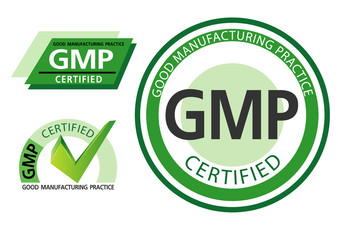
Long-term advantages of working with a trustworthy gelatin supplier
Innovation and product development: Cooperating with suppliers with rich industry experience can obtain technical support and promote product development. Funingpu has strong R&D capabilities and can provide customers with customized products and assist in the development of new applications.
Supply chain stability: Today, as global supply chains are constantly challenged, supply chain stability is particularly important. Reliable gelatin suppliers usually have a global production and distribution network that can maintain continuous supply in the event of raw material shortages or logistics obstructions. Funingpu has a global production and distribution network that can maintain stable supply in the event of raw material shortages or logistics obstructions, ensuring customer production continuity.
Choosing Funingpu as a partner not only provides high-quality gelatin products but also helps companies achieve sustainable development and maintain market competitiveness.

Final Thoughts
Gelatin significantly improves meat products’ texture, moisture, and stability. Funingpu, with its quality focus and sustainability commitment, is an ideal partner for businesses aiming to meet market demands for healthier, tastier products while staying competitive.
Phone: +86-577-88105990
Mobile: +86-138 5886 1938
Official Website: www.fnp-gelatin.com
Email: sales@funingpu.com
Address: No. 1-10 Wenpu Road, Yacheng Town, Xiapu County, Ningde City, Fujian Province




